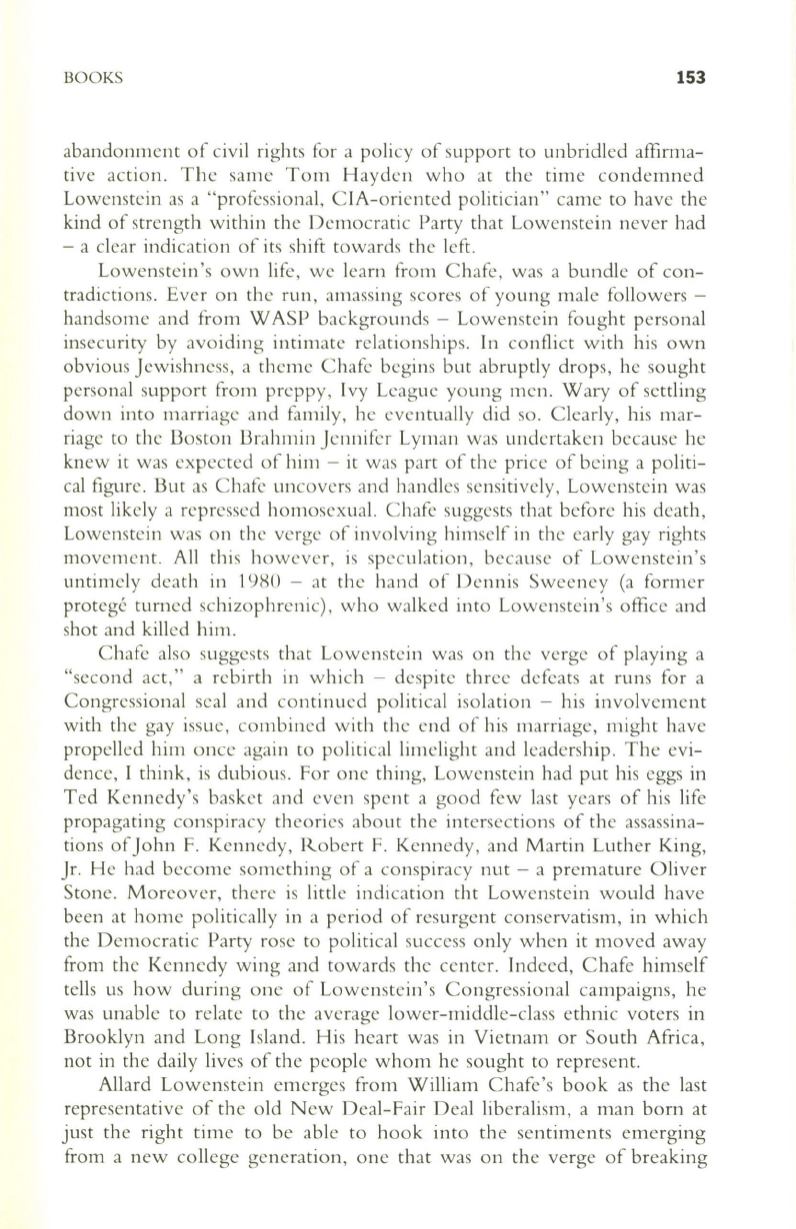
BOOKS
153
abandonment of civil rights for a policy of support to unbridled affirma–
tive action. The same Tom Hayden who at the time condemned
Lowenstein as a "professional, CIA-oriented politician" came
to
have the
kind of strength within the Democratic Party that Lowenstein never had
- a clear indication of its shift towards the left.
Lowenstein's own life, we learn from Chafe, was a bundle of con–
tradictions. Ever on the run, amassing scores of young male followers -
handsome and from WASP backgrounds - Lowenstein fought personal
insecurity by avoiding intimate relationships . In conflict with his own
obvious Jewishness, a theme Chafe begins but abruptly drops, he sought
personal support from preppy, Ivy League young men. Wary of settling
down into marriage and family, he eventually did so. Clearly, his mar–
riage to the Boston Brahmin Jennifer Lyman was undertaken because he
knew it was expected of him - it was part of the price of being a politi–
cal figure . But as Chafe uncovers and handles sensitively, Lowenstein was
most likely a repressed homosexual. Chafe suggests that before his death,
Lowenstein was on the verge of involving himself in the early gay rights
movement. All this however, is speculation, because of Lowenstein's
untimely death in 1980 - at the hand of Dennis Sweeney (a former
protege turned schizophrenic), who walked into Lowenstein's office and
shot and killed him.
Chafe also suggests that Lowenstein was on the verge of playing a
"second act," a rebirth in which - despite three defeats at runs for a
Congressional seal and continued political isolation - his involvement
with the gay issue, combined with the end of his marriage, might have
propelled him once again to political limelight and leadership . The evi–
dence, I think, is dubious. For one thing, Lowenstein had put his eggs in
Ted Kennedy's basket and even spent a good few last years of his life
propagating conspiracy theories about the intersections of the assassina–
tions ofJohn F. Kennedy, Robert F. Kennedy, and Martin Luther King,
Jr. He had become something of a conspiracy nut - a premature Oliver
Stone. Moreover, there is little indication tht Lowenstein would have
been at home politically in a period of resurgent conservatism, in which
the Democratic Party rose to political success only when it moved away
from the Kennedy wing and towards the center. Indeed, Chafe himself
tells us how during one of Lowenstein's Congressional campaigns, he
was unable to relate to the average lower-middle-class ethnic voters in
Brooklyn and Long Island. His heart was in Vietnam or South Africa,
not in the daily lives of the people whom he sought to represent.
Allard Lowenstein emerges from William Chafe's book as the last
representative of the old New Deal-Fair Deal liberalism, a man born at
just the right time to be able to hook into the sentiments emerging
from a new college generation, one that was on the verge of breaking


